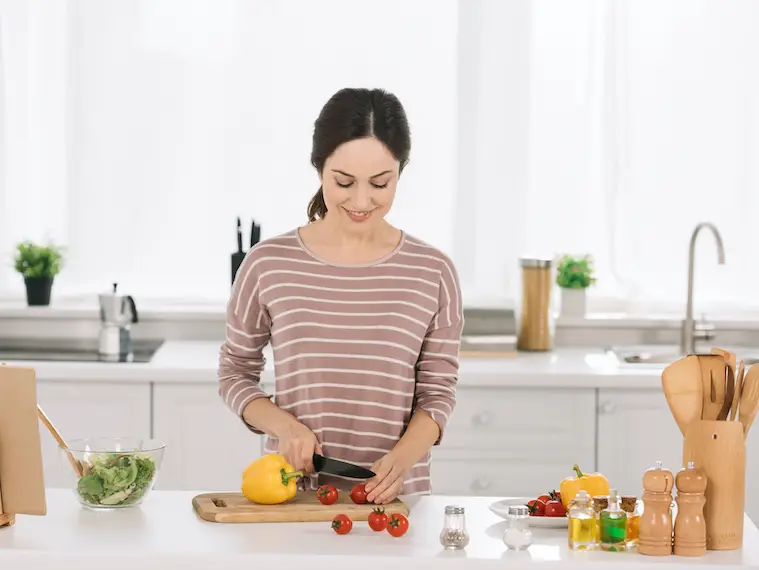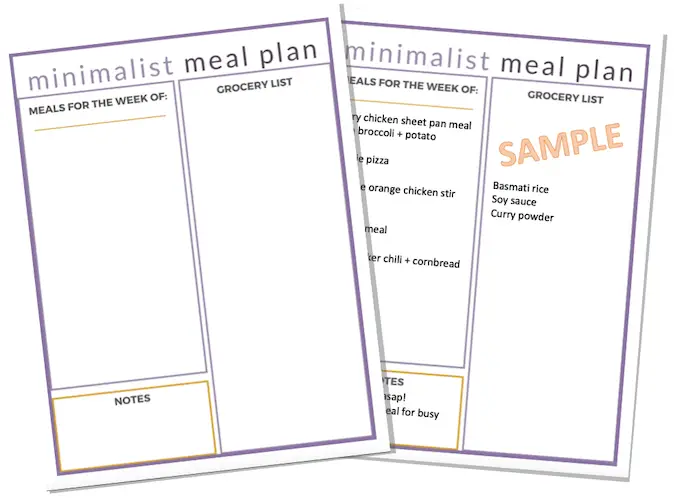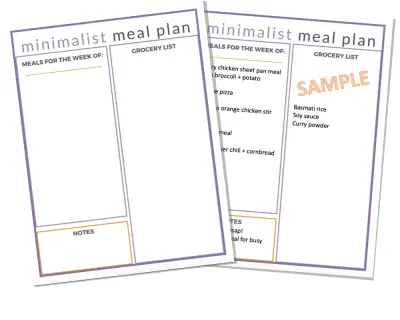These cooking tips are sure to save you time and effort in the kitchen.
Implement one new tip at a time and practice it until it becomes a habit. Then add another tip to continue to build on your good habits.
With a bit of practice, you’ll be able to eat a minimalist diet of delicious meals without spending all day in the kitchen!
But first off, let’s quickly define what minimalist cooking actually is.

What is minimalist cooking?
Minimalist cooking is a style of cooking that aims to simplify meals. This means saving time and effort in the kitchen.
A core value of minimalist cooking is that simple is best. You don’t need a lot of fancy ingredients and complicated recipes to make good food!
Minimalist cooking is one part of eating a minimalist diet, but the focus is specifically on the cooking and food prep rather than the actual type of food you eat.
Keep reading for all the tips!
Cook double or triple batches
Eat that meal for a few days or eat once and freeze leftovers for a quick meal a different day.
This allows you to cook and clean much less! Now you’re only cooking a few times per week instead of cooking something new each meal. You will only have to clean up the pots, pans, cutting board, etc when you cook every few days instead of every day.
Change up leftovers
In addition to eating leftovers as the same meal you originally cooked, try serving leftovers in different ways. This way you don’t have to eat the exact same meal multiple times if you don’t want to.
For example, cook roasted chicken and vegetables the first night. Eat chicken sandwiches for lunch the next day, then chicken and roasted veggies on pizza for supper. Use the chicken bones to make chicken stock to use in another meal.
Choose simple recipes
Recipes with 10 or fewer ingredients and 5 or fewer steps are ideal. I like to call these minimalist recipes.
Even the best chefs know that simple is often just as good (or better) than complicated dishes.
Especially when we’re cooking everyday meals, we don’t need intricate steps with a lot of ingredients. Try looking for recipes with “simple” or “easy” in the description.
I also recommend looking for recipes that are 30 minutes or less, or use hands-off cooking methods.
Baking, roasting, or using a slow cooker are pretty hands-off because you just put the food in, set the timer and wait.
Frying or stir-frying are a lot more hands-on because you have to stand over the stove and actively cook it the whole time.
This is all part of eating simply!
Make meals without recipes
Even better than simple recipes are meals that don’t require you to follow a recipe at all!
As you become more experienced in the kitchen, you’ll need to rely on recipes less and less.
Once you know how to cook a roast or a stir-fry, you really don’t need recipes for them anymore. Sure, you CAN look at a recipe for inspiration or to try something new, but it makes it so much simpler if you have a variety of core meals you can make without having to follow a recipe every time.
Use “hands off” cooking methods more often
These methods of cooking just require prep time, then you are free to do other things while the food is cooking.
Roasting, baking, and boiling, or cooking in the slow cooker/Instant Pot are some examples.
More hands on cooking methods would be dishes like frying, stir frying, or recipes like risotto where you have to be constantly stirring the dish.
There’s nothing wrong with these types of meals, but there is no doubt that they do tend to take more hands-on time which can feel like more work than other cooking methods.
Choose one pot/pan recipes
These types of recipes make fewer dirty dishes, so reduce clean up time. They are also generally pretty hands-off and include sheet pan meals, stir-frys, slow cooker/Instant Pot meals, skillet meals, or any recipe that has “one pot” in the title.
This is my favorite way to cook because I get to enjoy good food without as much effort!
Keep your kitchen minimal
Maintaining a minimalist kitchen includes only having the utensils and cooking appliances you use regularly. It also includes keeping the kitchen organized and tidy as much as possible as well!
This helps simplify cooking because you won’t need to clean up the kitchen before you start cooking supper (because it’s already clean!).
It will also save you time because you won’t have to search for the thing you want to use (you’ll know exactly where it is, and it isn’t shoved in behind other things).
Plus, with fewer things in your kitchen, you’ll have fewer things to clean! Guaranteed if you have 4 spatulas, you’ll just take a clean one out of the drawer and create an even bigger mess to clean up at the end of your cooking session.
You might also like:
Kitchen Essentials List
Minimalist Organization Tips
Minimalist Kitchen List
Use prepared foods
Prepared foods are foods that are basically ready to eat or just need to be heated. There is no additional steps required.
Generally if you’re eating like a minimalist you tend not to eat many packaged or prepared foods because you like to stick to foods with simple ingredient list and minimal processing.
BUT there are actually a lot of minimally processed foods that are simple, healthy, and will help you save time!
Think:
- frozen veggies & fruit
- fresh pre-chopped & washed produce
- canned beans & lentils
- canned fish in water
- dried pasta
- jarred pasta sauce
Learn to use core ingredients in multiple ways
You can easily make multiple meals with just a minimalist grocery list of core ingredients like meat, veggies, fruit, dairy, and grains.
Prepare the foods in different ways by seasoning or presenting it differently. Think how versatile chicken is. You could use it in recipes from almost every culture and prepare it in almost any way imaginable.
Most vegetables are even more versatile! Change the way you cut them, cook them, and season them and you have a completely different experience with the same core food.
Food prep
Doing some simple food prepping can really help you simplify the time you actually spend cooking.
When you have some parts of meals and snacks already prepared, it greatly reduces the amount of time you need to prep right before each meal you cook.
It also reduces the amount of cleaning you need to do. For instance, if you prepped all the veggies you’re going to eat in the next few days, you only have to wash the knife and cutting board once, versus having to clean it after every time you use it to cut a couple things each time.
If you wash all your fruit and veggies for the week you will save time in not having to do it before each time you eat.
Some ways I like to food prep are:
- boil eggs
- roast chicken
- wash veggies and fruit
- chop some veggies and fruit (don’t chop it all at once)
- marinate meat
- batch cook some grains like rice or quinoa
- make a batch of muffins, energy bites, or granola bars for easy snacks
Meal prep
It’s common to think of meal prep and food prep as the same, but I think they are different enough to be mentioned separately.
Food prep focuses only on preparing individual foods, whereas meal prep focuses on preparing the entire meal in advance.
I can see how meal prep can be really handy especially for packed lunches. But personally I don’t love it as it encourages eating the exact same thing every day of the week. To me that seems super uninspiring.
Not to mention cooking for a whole week in advance is bound to cause food waste, or in the worst case scenario, give yourself food poisoning. Most food is only good 3-4 days in the fridge, and some foods should be tossed even before then.
If you are going to meal prep like this, only do a few days at a time.
Another way to meal prep but avoid this problem is to create freezer meals that are easy to simply thaw and cook, without having to prep anything.
If you have enough freezer space, you could prepare a batch of a single recipe, freeze them, then cook once every few weeks. If you have a few recipes like this stored in the freezer it could definitely help come meal time.
This method saves a bit of time because all the prep is done at once, but personally I prefer to just cook a large batch of meals at once then freeze leftovers. Then you have ready made meals for days when you don’t have time to cook.
If you liked these tips, you will love Minimalist Meal Planning!
Let me know which minimalist cooking tip has made the most impact on simplifying your cooking!
Keep Reading:
Simplify Your Kitchen in these 8 Easy Steps!


